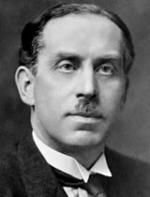Disable ads!
Charles Glover Barkla
Charles Glover Barkla FRS (7 June 1877 – 23 October 1944) was a British physicist, and the winner of the Nobel Prize in Physics in 1917 for his work in X-ray spectroscopy and related areas in the study of X-rays (Roentgen rays). Barkla was born in Widnes, England to John Martin Barkla, a secretary for the Atlas Chemical Company and Sarah Glover, daughter of a watchmaker. Barkla studied at the Liverpool Institute and proceeded by Liverpool University with a County Council Scholarship and a Bibby Scholarship. Barkla initially studied Mathematics but later specialised in Physics under Sir Oliver Lodge. During the absence of Oliver Lodge due to ill health, Barkla would replace him in lectures.[citation needed] In 1899, Barkla was admitted to Trinity College, Cambridge, with an 1851 Research Fellowship from the Royal Commission for the Exhibition of 1851, to work in the Cavendish Laboratory under the physicist J. J. Thomson (discoverer of the electron). During his first two years at Cambridge, Barkla would, under the directions of J.J. Thomson, study the velocity of electromagnetic waves along wires of different widths and materials. After a year and a half at Trinity College, Cambridge, his love of music led him to transfer to King's College, Cambridge in order to sing in their chapel choir. Barkla's baritone voice was of remarkable beauty and his solo performances would always be fully attended.[citation needed] He completed his Bachelor of Arts degree in 1903, and then his Master of Arts degree in 1907. In 1913, after having worked at the Universities of Cambridge, Liverpool, and King's College London, Barkla was appointed as a Professor of Natural Philosophy at the University of Edinburgh, a position that he held until his death. Barkla married Mary Esther Cowell in 1907, with whom he would have two sons and one daughter. Barkla made significant progress in developing and refining the laws of X-ray scattering, X-ray spectroscopy, the principles governing the transmission of X-rays through matter, and especially the principles of the excitation of secondary X-rays. For his discovery of the characteristic X-rays of elements, Barkla was awarded the Nobel Prize in Physics in 1917. He was also awarded the Hughes Medal of the British Royal Society that same year.
 Read more on wikipedia.org Read more on wikipedia.org
 All quotes by Charles Glover Barkla All quotes by Charles Glover Barkla
 Edit Edit
|

|
|
|
|
|
Background photo by Giuliana
|